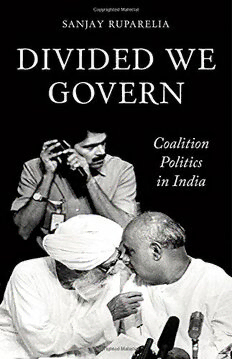Table Of ContentDIVIDED WE GOVERN
SANJAY RUPARELIA
Divided We Govern
Coalition Politics in Modern India
A
A
Oxford University Press is a department of the
University of Oxford. It furthers the University’s objective
of excellence in research, scholarship, and education
by publishing worldwide.
Oxford New York
Auckland Cape Town Dar es Salaam Hong Kong Karachi
Kuala Lumpur Madrid Melbourne Mexico City Nairobi
New Delhi Shanghai Taipei Toronto
With offices in
Argentina Austria Brazil Chile Czech Republic France Greece
Guatemala Hungary Italy Japan Poland Portugal Singapore
South Korea Switzerland Thailand Turkey Ukraine Vietnam
Oxford is a registered trade mark of Oxford University Press
in the UK and certain other countries.
Published in the United States of America by
Oxford University Press
198 Madison Avenue, New York, NY 10016
Copyright © Sanjay Ruparelia 2015
All rights reserved. No part of this publication may be reproduced,
stored in a retrieval system, or transmitted, in any form or by any means,
without the prior permission in writing of Oxford University Press,
or as expressly permitted by law, by license, or under terms agreed with
the appropriate reproduction rights organization. Inquiries concerning
reproduction outside the scope of the above should be sent to the
Rights Department, Oxford University Press, at the address above.
You must not circulate this work in any other form
and you must impose this same condition on any acquirer.
Library of Congress Cataloging-in-Publication Data is available
Sanjay Ruparelia.
Divided We Govern: Coalition Politics in Modern India.
ISBN: 9780190264918
“Men make their own history, but they do not make it just as they please; they
do not make it under circumstances chosen by themselves, but rather under cir-
cumstances found, given and transmitted.”
Karl Marx, The Eighteenth Brumaire of Louis Bonaparte
“In decisive historical moments, political capacity (which includes organiza-
tion, will, and ideologies) is necessary to enforce or to change a structural sit-
uation. Intellectual evaluation of a given situation and ideas about what is to
be done are crucial in politics. The latter is immersed in the shady area between
social interests and human creativity. At that level, gambles more than cer-
tainty line the paths through which social forces try to maintain or to change
social structures. Briefly, in spite of structural ‘determination’, there is room
for alternatives in history. Their actualization will depend not just on the basic
contradictions between interests, but also on the perception of new ways of
turning a historical corner through ‘a passion for the possible.’”
Fernando Henrique Cardoso and Enzo Faletto,
Dependency and Development in Latin America
“[The] very probability of committing mistakes presupposes simultaneously a
political project, some choice among strategies, and objective conditions that
are independent with regard to a particular movement. If the strategy of a
party is uniquely determined, then the notion of ‘mistakes’ is meaningless: the
party can only pursue the inevitable … [But the] notion of mistakes is also ren-
dered meaningless within the context of a radically voluntaristic understand-
ing of historical possibilities … if everything is always possible, then only
motives explain the course of history … ‘Betrayal’ is indeed a proper way of
understanding social democratic strategies in a world free of objective con-
straints. But accusations of betrayal are not particularly illuminating in the
real world.”
Adam Przeworksi, Capitalism and Social Democracy
“What were the arguments used by those opposed to you being Prime
Minister?
… Our argument was: this cannot last five years. If we are there, much more
than the others we can make them accept some policies, put them before the
country, whatever the limits are. You can’t remove every obstacle, that is not
possible: but we could do something for self-reliance, for the countryside, for
panchayats, all that we can push through. Anti-poverty programmes: it is there
but it does not reach the people. … But it is a political blunder. It is a histori-
cal blunder … We do not accept many of their policies, they do not accept
many of ours. But the minimum programme was there, and we could have
implemented it much better than others. Because we have the experience, noth-
ing more, nothing personal.”
Jyoti Basu, former chief minister of West Bengal
CONTENTS
Acknowledgements ix
List of Tables xv
Abbreviations xvii
Glossary xxiii
Introduction 1
1. The Paradoxes of India’s Coalition Politics 15
PART I
THE GENESIS OF THE THIRD FORCE
2. The Roots of the Broader Indian Left (1934–1977) 45
3. The Janata Party (1977–1980) 67
4. The Rise of the Regions (1980–1989) 89
5. The National Front (1989–1991) 103
PART II
THE MATURATION OF THE THIRD FORCE
6. The Crystallization of the Third Force (1991–1996) 125
7. The Formation of the United Front (May 1996) 147
8. Establishing Political Authority (June–September 1996) 181
9. Exercising National Power (September–December 1996) 213
10. Reform amid Crisis (January–April 1997) 235
PART III
THE FALL OF THE THIRD FORCE
11. The Decline of the United Front (May 1997–March 1998) 257
vii
CONTENTS
12. The Dissolution of the Third Force (1998–2012) 287
Conclusion 319
Notes 345
Bibliography 419
Index 451
viii

